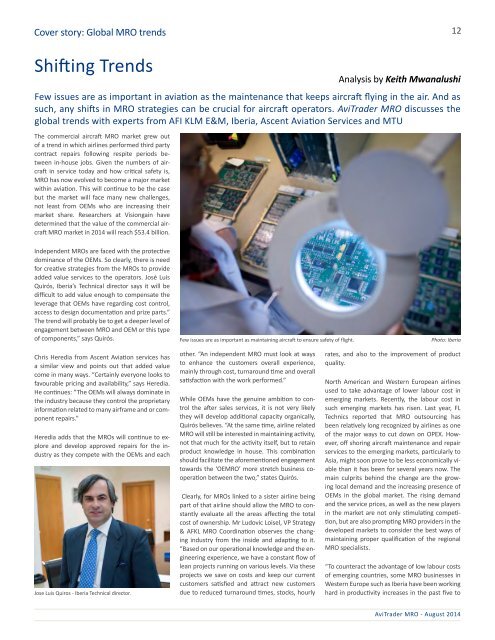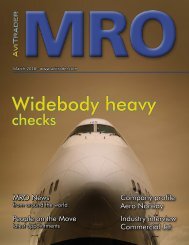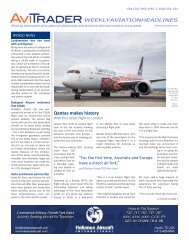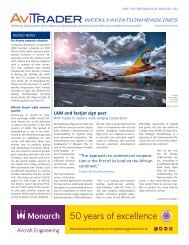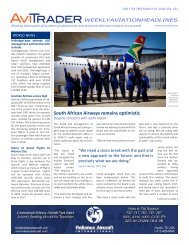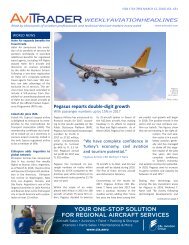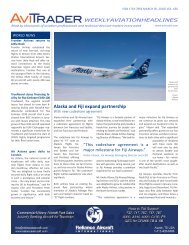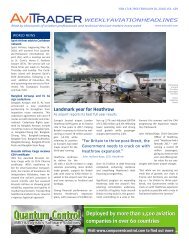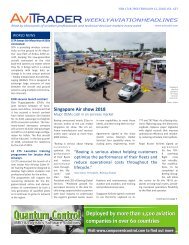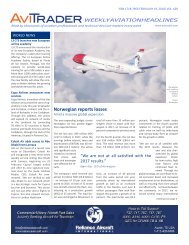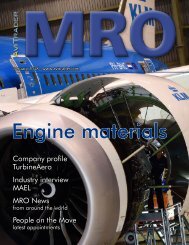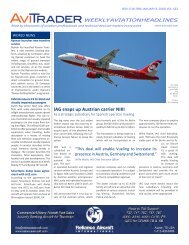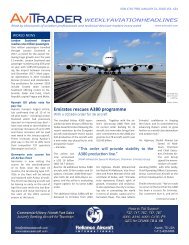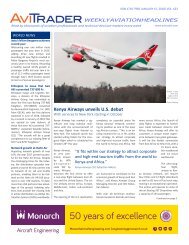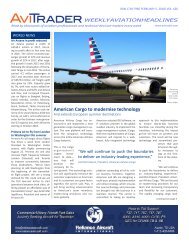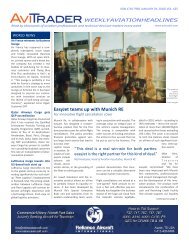AviTrader_Monthly_MRO_e-Magazine_2014-08
AviTrader_Monthly_MRO_e-Magazine_2014-08
AviTrader_Monthly_MRO_e-Magazine_2014-08
You also want an ePaper? Increase the reach of your titles
YUMPU automatically turns print PDFs into web optimized ePapers that Google loves.
Cover story: Global <strong>MRO</strong> trends<br />
12<br />
Shifting Trends<br />
Few issues are as important in aviation as the maintenance that keeps aircraft flying in the air. And as<br />
such, any shifts in <strong>MRO</strong> strategies can be crucial for aircraft operators. <strong>AviTrader</strong> <strong>MRO</strong> discusses the<br />
global trends with experts from AFI KLM E&M, Iberia, Ascent Aviation Services and MTU<br />
The commercial aircraft <strong>MRO</strong> market grew out<br />
of a trend in which airlines performed third party<br />
contract repairs following respite periods between<br />
in-house jobs. Given the numbers of aircraft<br />
in service today and how critical safety is,<br />
<strong>MRO</strong> has now evolved to become a major market<br />
within aviation. This will continue to be the case<br />
but the market will face many new challenges,<br />
not least from OEMs who are increasing their<br />
market share. Researchers at Visiongain have<br />
determined that the value of the commercial aircraft<br />
<strong>MRO</strong> market in <strong>2014</strong> will reach $53.4 billion.<br />
Analysis by Keith Mwanalushi<br />
Independent <strong>MRO</strong>s are faced with the protective<br />
dominance of the OEMs. So clearly, there is need<br />
for creative strategies from the <strong>MRO</strong>s to provide<br />
added value services to the operators. José Luis<br />
Quirós, Iberia’s Technical director says it will be<br />
difficult to add value enough to compensate the<br />
leverage that OEMs have regarding cost control,<br />
access to design documentation and prize parts.”<br />
The trend will probably be to get a deeper level of<br />
engagement between <strong>MRO</strong> and OEM or this type<br />
of components,” says Quirós.<br />
Few issues are as important as maintaining aircraft to ensure safety of flight.<br />
Photo: Iberia<br />
Chris Heredia from Ascent Aviation services has<br />
a similar view and points out that added value<br />
come in many ways. “Certainly everyone looks to<br />
favourable pricing and availability,” says Heredia.<br />
He continues: “The OEMs will always dominate in<br />
the industry because they control the proprietary<br />
information related to many airframe and or component<br />
repairs.”<br />
Heredia adds that the <strong>MRO</strong>s will continue to explore<br />
and develop approved repairs for the industry<br />
as they compete with the OEMs and each<br />
Jose Luis Quiros - Iberia Technical director.<br />
other. “An independent <strong>MRO</strong> must look at ways<br />
to enhance the customers overall experience,<br />
mainly through cost, turnaround time and overall<br />
satisfaction with the work performed.”<br />
While OEMs have the genuine ambition to control<br />
the after sales services, it is not very likely<br />
they will develop additional capacity organically,<br />
Quirós believes. “At the same time, airline related<br />
<strong>MRO</strong> will still be interested in maintaining activity,<br />
not that much for the activity itself, but to retain<br />
product knowledge in house. This combination<br />
should facilitate the aforementioned engagement<br />
towards the ‘OE<strong>MRO</strong>’ more stretch business cooperation<br />
between the two,” states Quirós.<br />
Clearly, for <strong>MRO</strong>s linked to a sister airline being<br />
part of that airline should allow the <strong>MRO</strong> to constantly<br />
evaluate all the areas affecting the total<br />
cost of ownership. Mr Ludovic Loisel, VP Strategy<br />
& AFKL <strong>MRO</strong> Coordination observes the changing<br />
industry from the inside and adapting to it.<br />
“Based on our operational knowledge and the engineering<br />
experience, we have a constant flow of<br />
lean projects running on various levels. Via these<br />
projects we save on costs and keep our current<br />
customers satisfied and attract new customers<br />
due to reduced turnaround times, stocks, hourly<br />
rates, and also to the improvement of product<br />
quality.<br />
North American and Western European airlines<br />
used to take advantage of lower labour cost in<br />
emerging markets. Recently, the labour cost in<br />
such emerging markets has risen. Last year, FL<br />
Technics reported that <strong>MRO</strong> outsourcing has<br />
been relatively long recognized by airlines as one<br />
of the major ways to cut down on OPEX. However,<br />
off shoring aircraft maintenance and repair<br />
services to the emerging markets, particularly to<br />
Asia, might soon prove to be less economically viable<br />
than it has been for several years now. The<br />
main culprits behind the change are the growing<br />
local demand and the increasing presence of<br />
OEMs in the global market. The rising demand<br />
and the service prices, as well as the new players<br />
in the market are not only stimulating competition,<br />
but are also prompting <strong>MRO</strong> providers in the<br />
developed markets to consider the best ways of<br />
maintaining proper qualification of the regional<br />
<strong>MRO</strong> specialists.<br />
“To counteract the advantage of low labour costs<br />
of emerging countries, some <strong>MRO</strong> businesses in<br />
Western Europe such as Iberia have been working<br />
hard in productivity increases in the past five to<br />
<strong>AviTrader</strong> <strong>MRO</strong> - August <strong>2014</strong>


